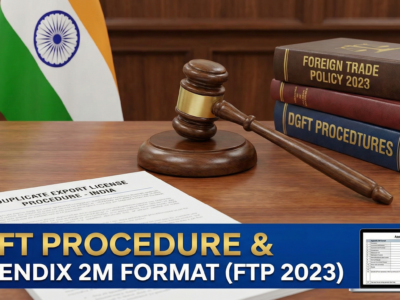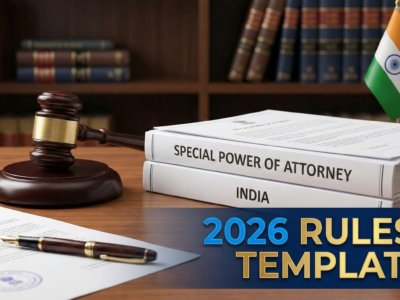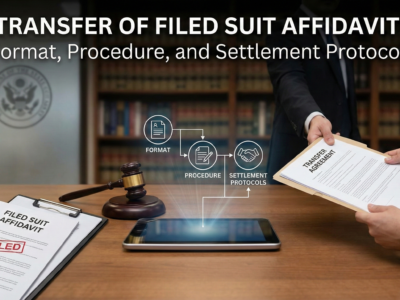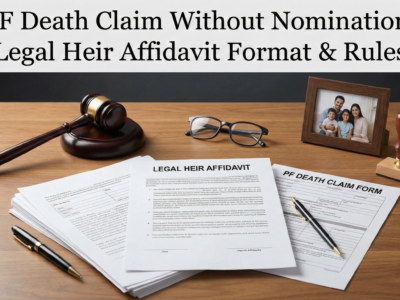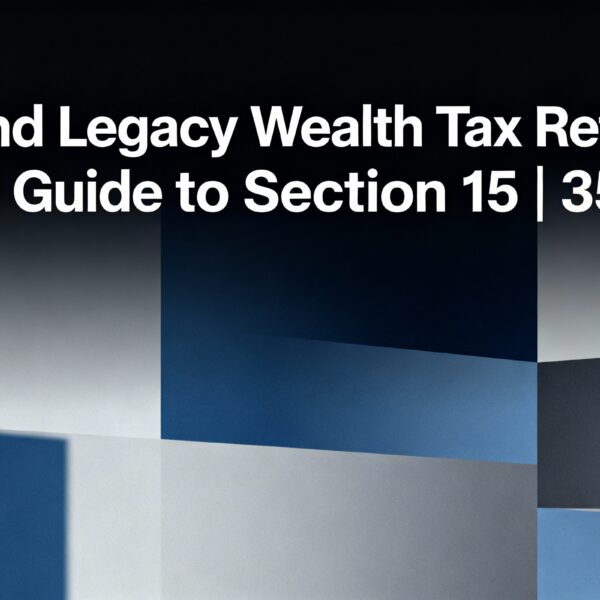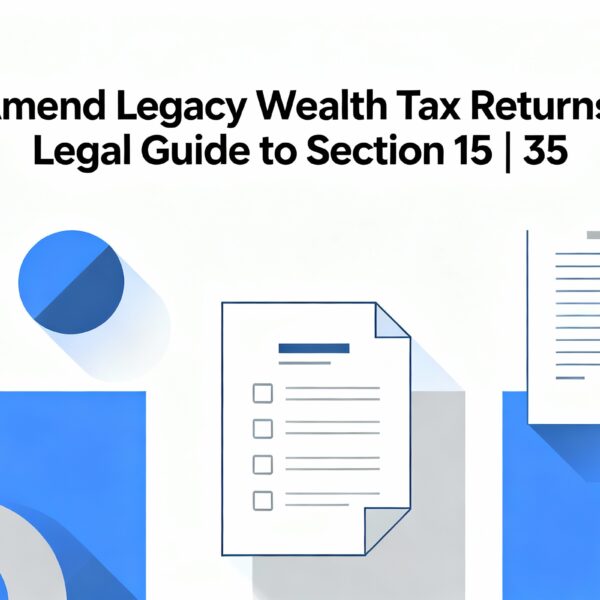Order XLI Rule 5 CPC: A Complete Guide to Stay of Execution
Receiving an adverse judgment can be daunting, but the legal process provides a crucial next step: filing an appeal. To ensure the appeal is meaningful, it’s essential to prevent the decree from being enforced immediately.
This is achieved by obtaining a stay of execution under Order XLI Rule 5 of the Code of Civil Procedure, 1908. This guide from Evaakil.com provides a comprehensive walkthrough of the entire procedure, from satisfying the three core conditions of substantial loss, no delay, and furnishing security, to drafting a compelling application and affidavit with our ready-to-use legal formats.
A Guide to Staying Execution of Judgment under Order XLI Rule 5 CPC
A Practitioner's Guide to Seeking Stay of Execution under Order XLI Rule 5 of the CPC, 1908
The journey through appellate litigation often involves a pivotal moment: seeking a stay of execution. This process places the rights of a decree-holder against an appellant's right to a meaningful appeal. The legal balance for this is found within Order XLI Rule 5 of the Code of Civil Procedure, 1908 (CPC). A clear grasp of this provision is the bedrock of any successful stay application.
Part I: The Legal Architecture of a Stay
The Foundational Principle: An Appeal Does Not Automatically Halt Execution
The most basic rule, stated in Order XLI Rule 5(1), is that filing an appeal does not, by itself, stop the execution of a court's decree. A judgment is presumed valid and enforceable. This policy upholds the finality of trial court decisions and prevents appeals from being used simply as a delay tactic. The appellant must actively apply to the court and show "sufficient cause" for the execution to be paused.
Jurisdictional Pathways: Where to File for a Stay
An appellant has two options for seeking a stay, and understanding the difference is key for effective strategy. The infographic below illustrates the typical timeline and the roles of the trial and appellate courts.
Infographic: Timeline for Seeking a Stay
The primary power rests with the Appellate Court under Rule 5(1) for a stay during the appeal. However, for immediate relief, an appellant can approach the Trial Court (the court that passed the decree) under Rule 5(2). This is only possible before the time limit for filing an appeal expires. Securing a temporary stay from the trial court is a smart move that provides breathing room to prepare the main stay application for the appellate court.
The Three Pillars of a Stay Application
The court's decision to grant a stay is not arbitrary. It is guided by three mandatory conditions in Order XLI Rule 5(3). An appellant must satisfy all three. These conditions are not a checklist but interdependent elements of a persuasive argument.
Interactive Chart: The Three Mandatory Conditions
- Substantial Loss: The appellant must show that they will suffer a significant, material loss that cannot be easily remedied if the stay is not granted. Examples include the demolition of a home or the loss of a sole source of livelihood.
- No Unreasonable Delay: The application must be filed promptly. Any delay suggests the claim of imminent loss might not be genuine and weakens the application.
- Furnishing of Security: The applicant must provide security to guarantee the decree will be satisfied if the appeal fails. This protects the decree-holder from losses caused by the delay in execution.
Part II: Judicial Discretion and Key Precedents
The text of Order XLI Rule 5 is brought to life by judicial interpretation. Courts have developed principles to apply the rule flexibly, guided by equity and justice.
The Evolution of Stays for Money Decrees
Historically, stays on money decrees were rarely granted without a full deposit of the decretal amount. However, the Supreme Court in Lifestyle Equities C.V. & Anr. v. Amazon Technologies Inc. shifted this view. It held that depositing the amount is directory, not mandatory. The main factor is "sufficient cause." The court outlined that an unconditional stay can be granted if the decree is found to be perverse, facially untenable, or patently illegal, requiring a prima facie look at the merits of the appeal itself.
Stays in Possession Decrees: The Market Rent Principle
For eviction decrees, the Supreme Court in Atma Ram Properties (P) Ltd. v. Federal Motors (P) Ltd. established a vital economic principle. When a stay is granted, the tenant, now an unauthorized occupant, must compensate the landlord. The court ruled this compensation should be based on the prevailing market rent, not the old contractual rent. This prevents the appellant from profiting unfairly from the litigation process.
Filterable Table of Landmark Judgments
To aid practitioners, the following table summarizes key principles from controlling precedents. You can filter the table by the type of decree to quickly find relevant information.
| Case Name | Principle on Security/Deposit | Nuance on Court's Discretion |
|---|---|---|
| Atma Ram Properties (P) Ltd. | Security can be payment of mesne profits at the market rate, not just contractual rent. | The court can set "reasonable terms" to compensate the decree-holder for losses from the delay. |
| Lifestyle Equities C.V. | Deposit is directory, not mandatory. An unconditional stay is possible in exceptional cases. | An unconditional stay is justified if the decree is "egregiously perverse" or "facially untenable." |
| Sihor Nagar Palika Bureau | In money decrees, the court should not grant a blanket stay. A deposit of the amount is the norm. | The court has discretion to allow the decree-holder to withdraw the deposited amount by furnishing security. |
| Ram Singh & Ors. | Security is not the only condition. The court can order status quo maintenance. | A party who agrees to a stay's terms for a long time cannot later challenge those terms (estoppel). |
Part III: A Practitioner's Guide to Drafting
The quality of the application and affidavit can determine the outcome. These documents are the primary tools for persuading the court.
The Supporting Affidavit: Your Core Argument
The affidavit contains the sworn facts that satisfy the conditions of Rule 5(3). It must tell a persuasive story. Vague statements are not enough; be specific and, if possible, quantify the "substantial loss."
Infographic: Anatomy of a Strong Affidavit
A strong affidavit moves from generic claims to specific, verifiable facts. For example:
- Weak: "The applicant will suffer great hardship if the decree is executed."
- Strong: "If evicted, the Applicant's retail shop, their sole income source supporting a family of five, will be destroyed, leading to irreparable financial ruin and homelessness."
Proactively offering to furnish reasonable security demonstrates good faith and strengthens the application considerably.
Part IV: Procedural Formalities and Strategy
A well-drafted application can still fail due to procedural missteps. Careful handling of the filing process is necessary.
The Complete Filing Checklist
Ensure your application is complete to avoid registry defects and delays. You will need:
- The Miscellaneous Application (under Order XLI Rule 5).
- The sworn Supporting Affidavit.
- A copy of the Memorandum of Appeal.
- Certified copy of the impugned Judgment and Decree.
- Any relevant annexures (e.g., financial statements).
- Vakalatnama and proof of court fees.
The Lifecycle of an Ex Parte Stay
In emergencies, a court can grant an ex parte stay without hearing the other side (Rule 5(4)). This requires showing an immediate threat of irreparable harm. However, this is just the first step. The respondent has the right to apply for vacating the stay. The infographic below shows this dynamic process.
Infographic: Lifecycle of a Stay Order
Grounds for vacating a stay include suppression of facts, misrepresentation, or a change in circumstances. This tactical battle requires rapid responses and a deep understanding of equitable principles from counsel on both sides.
Part V: Strategic Considerations for Respondents
For the decree-holder, a stay application represents a hurdle to enjoying the fruits of a successful litigation. The respondent's goal is to either defeat the stay application or ensure that any stay granted is on terms that fully protect their interests.
Opposing the Stay Application
A respondent's counter-affidavit should directly challenge the appellant's claims on the three pillars:
- Refuting 'Substantial Loss': Argue that the claimed loss is exaggerated, speculative, or can be compensated with money. For example, if a business claims ruin, show evidence of its other branches or income streams.
- Highlighting Delay: Scrutinize the timeline. If the appellant waited weeks or months after the decree to file for a stay, argue that this delay demonstrates a lack of genuine urgency.
- Demanding Adequate Security: Insist on security that covers the entire decretal amount plus future interest and costs. For property, demand security equivalent to its market value or the potential loss from delayed possession (mesne profits).
Seeking Vacation of an Ex Parte Stay
If an ex parte stay has been granted, the respondent should act swiftly. Key grounds to argue for its vacation include:
- Suppression of Material Facts: Did the appellant fail to disclose relevant information to the court? For instance, did they hide the fact that they have alternative accommodations in an eviction case?
- Misrepresentation: Was the court misled by false statements in the appellant's affidavit?
- Hardship to the Decree-Holder: Demonstrate the severe prejudice the stay is causing you. An elderly landlord who depends on rent for medical expenses presents a compelling case against a stay.
Part VI: Comparative Analysis - Stay vs. Injunction
While both a stay and an injunction result in halting certain actions, they are distinct legal remedies. Understanding the difference is important for choosing the correct application.
| Feature | Stay Order (Order XLI Rule 5) | Injunction (Order XXXIX) |
|---|---|---|
| Purpose | To halt the execution of a decree already passed. | To prevent a party from doing a specific act during the pendency of a suit. |
| Timing | Post-decree, during an appeal. | Pre-decree, during the trial/suit. |
| Governing Principle | Substantial loss, no delay, security. | Prima facie case, balance of convenience, irreparable injury. |
| Effect | Suspends the enforcement of a judicial order. It is a procedural hold. | Restrains a party's actions. It is a substantive order directing a party. |
Part VII: Interactive Filing Checklist
Use this interactive checklist to ensure your stay application is complete and robust before filing. A thorough preparation minimizes the risk of defects and strengthens your case from the outset.
Pre-Filing Checklist
Part VIII: Legal Formats and Templates
These formats provide a starting point for practitioners. They should be adapted to the specific facts and circumstances of each case.
A. Format for Application under Order XLI Rule 5, CPC
BEFORE THE HON'BLE [Name of Court] AT [City]
CIVIL APPELLATE JURISDICTION
MISCELLANEOUS APPLICATION NO. ______ OF 20__
IN
FIRST APPEAL NO. ______ OF 20__
IN THE MATTER OF:
[Appellant's Name & Address] ... Applicant/Appellant
VERSUS
[Respondent's Name & Address] ... Respondent
APPLICATION UNDER ORDER XLI RULE 5 OF THE CODE OF CIVIL PROCEDURE, 1908 FOR STAY OF EXECUTION OF THE JUDGMENT AND DECREE DATED [Date of Judgment] PASSED BY [Name of Lower Court] IN [Case No.]
MOST RESPECTFULLY SHOWETH:
1. That the Applicant/Appellant has filed the accompanying First Appeal against the impugned judgment and decree dated [Date], passed by the learned [Name of Lower Court].
2. That the Applicant/Appellant has a strong prima facie case and the appeal is likely to succeed on merits.
3. That the Respondent has initiated/is likely to initiate execution proceedings to execute the said decree. If the execution is not stayed, the Applicant/Appellant will suffer substantial and irreparable loss and injury, and the appeal itself will become infructuous.
4. That this application is being made bona fide and without any unreasonable delay.
5. That the Applicant/Appellant is prepared to furnish such security as this Hon'ble Court may deem fit and proper.
6. That the balance of convenience lies entirely in favour of the Applicant/Appellant.
PRAYER
It is, therefore, most respectfully prayed that this Hon'ble Court may be pleased to:
(a) Grant an ex-parte ad-interim stay on the execution of the judgment and decree dated [Date] passed in [Case No.], pending the hearing of this application;
(b) Stay the execution of the said judgment and decree pending the final disposal of the accompanying appeal;
(c) Pass such other and further orders as this Hon'ble Court may deem fit and proper in the interests of justice.
AND FOR THIS ACT OF KINDNESS, THE APPLICANT AS IN DUTY BOUND SHALL EVER PRAY.
Place: [City]
Date: [Date]
THROUGH
(ADVOCATE FOR APPLICANT/APPELLANT)
B. Format for Supporting Affidavit
BEFORE THE HON'BLE [Name of Court] AT [City]
CIVIL APPELLATE JURISDICTION
AFFIDAVIT
IN
MISCELLANEOUS APPLICATION NO. ______ OF 20__
IN
FIRST APPEAL NO. ______ OF 20__
IN THE MATTER OF:
[Appellant's Name & Address] ... Deponent/Appellant
VERSUS
[Respondent's Name & Address] ... Respondent
AFFIDAVIT
I, [Appellant's Name], son of [Father's Name], aged about [Age] years, resident of [Address], do hereby solemnly affirm and state as under:
1. That I am the Appellant in the above matter and the deponent herein. I am fully conversant with the facts and circumstances of the case and am competent to swear this affidavit.
2. That I have filed an appeal against the judgment and decree dated [Date] passed by [Name of Lower Court]. The contents of the accompanying application under Order XLI Rule 5 are true and correct and are not repeated here for the sake of brevity.
3. (Substantial Loss): That if the impugned decree is executed, I will suffer substantial and irreparable loss. [Here, clearly and specifically describe the loss. For eviction, state: "The suit property is my only residence where I live with my family." For a money decree: "The decretal amount is substantial, and its payment would render my business insolvent, causing financial ruin from which I cannot recover." Attach supporting documents if any.]
4. (No Unreasonable Delay): That I applied for the certified copy of the judgment on [Date] and received it on [Date]. The present appeal and stay application have been filed promptly thereafter without any laches or delay on my part.
5. (Furnishing Security): That I am ready and willing to furnish such security as this Hon'ble Court may direct for the due performance of the decree, if it is ultimately found binding upon me.
6. That the balance of convenience is in my favour and against the respondent. No prejudice will be caused to the Respondent if the stay is granted, whereas I will suffer irreparable harm if it is refused.
VERIFICATION
Verified at [City] on this [Day] day of [Month], 20__, that the contents of the above affidavit from paragraphs 1 to 6 are true to my personal knowledge and belief. No part of it is false and nothing material has been concealed therefrom.
DEPONENT
Part IX: Frequently Asked Questions (FAQ)
What is the difference between 'mesne profits' and 'market rent'?
Market rent is the potential rent a property would fetch on the open market. Mesne profits are damages for wrongful possession, which typically includes the market rent plus any interest or other losses incurred by the landlord due to the wrongful occupation.
Can a stay be granted if the decree has already been partially executed?
Yes, a stay can be granted for the remaining, unexecuted part of the decree. The court can also, in exceptional cases, order restitution of the partially executed portion, but this is rare and requires a very strong case.
What types of security are acceptable to the court?
The court has wide discretion. Common forms include a cash deposit in court, a bank guarantee from a nationalized bank, or furnishing an immovable property as security by depositing its title deeds. The security must be sufficient to cover the decretal amount.
Does a stay order from the Supreme Court automatically apply to related proceedings?
Not necessarily. A stay order is specific to the proceedings and decree it mentions. Unless the order explicitly stays "all further proceedings," it may not apply to related but separate cases (e.g., contempt proceedings arising from the original matter). The wording of the stay order is paramount.



